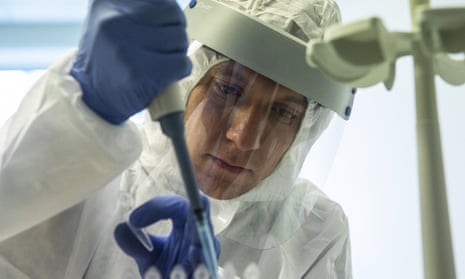The World Health Organization is in discussions with Russia to obtain more information about its experimental Covid-19 vaccine – named Sputnik V - even as Russia plans to give it to some 40,000 people next week for further testing.
Last week, Russia became the first country in the world to license a coronavirus vaccine when the president, Vladimir Putin, announced its approval ahead of conventional phase 3 testing.
At the time of the announcement the vaccine had not passed the advanced trials normally required to prove it works before being licensed, a major breach of scientific protocol. Russian officials claimed the vaccine would provide lasting immunity to Covid-19 but offered no proof.
But it emerged on Thursday that some large-scale testing will now apparently go ahead as the vaccine is rolled out, with Sputnik V’s financial backers saying that about 40,000 people would be given the vaccine starting next week in tests overseen by a foreign research body.
Catherine Smallwood, a senior emergency official at WHO/Europe, said the agency had begun direct discussions with Russia and that WHO officials have been sharing the various steps and information required for the WHO to take assessments.
Hans Kluge, director of WHO/Europe, said the agency welcomed all advances in vaccine development but that every vaccine must submit to the same clinical trials.
“We’re not going through a rushed job of trying to jump to conclusions here,” Smallwood said. “We want to take our time to really understand where the vaccine is at and to get as full information as possible on the steps that have already been taken.”
The disclosure came as Kluge said the global health body believed that Europe can combat Covid-19 without full lockdowns now that authorities are better prepared and have gained knowledge about how to fight it in recent months.
“With the basic nationwide and additional targeted measures, we are in a much better position to stamp out these localised virus flare-ups,” Kluge told reporters. “We can manage the virus and keep the economy running and an education system in operation,” he added.
The talks come as Donald Trump threw his weight behind a therapeutic treatment for coronavirus using blood plasma.
Following reports of the regulators’ decision to put on hold an emergency authorisation for its use, the US president said he believed the move could be politically motivated, adding: “I’ve heard fantastic things about convalescent plasma.”
An emergency approval by the Food and Drug Administration (FDA) for the use of blood plasma as a coronavirus treatment was put on hold over concerns the data backing it was too weak, the New York Times reported on Wednesday.
Rushed and haphazard approaches to both developing a vaccine and finding therapies for the virus have attracted increasing concern from experts, with Trump in particular touting both unproven drugs, such as hydroxychloroquine, and sometimes bizarre remedies, including bleach.
India’s health ministry suggested that almost 30% of the population in India’s capital of New Delhi may have been infected by Covid-19, according to a serological survey of 15,000 people conducted by the local government, a figure that indicates infection numbers are much higher than those recorded.
The survey, which tested a sample of the population for the presence of antibodies, was done in the national capital territory in the first week of August, Delhi’s health minister, Satyendra Jain, told a news conference on Thursday.
“We found that 29.1% of the population of Delhi had antibodies, which means that they were infected and have been cured,” Jain said.
Delhi has a population of 20 million and has recorded a total of 140,767 cases of Covid-19, out of India’s total of 2.84 million.
The findings of the survey are in line with what other cities such as Mumbai and Pune have discovered, that a significant number of their people have been infected.
India reported a record daily jump of 69,652 coronavirus infections on Thursday, data from the federal health ministry showed. Deaths rose by 977 to a total of 53,866.
India is the worst-hit country in Asia and globally third only behind the US and Brazil in number of cases.
Meanwhile Belgium has announced that schools will reopen on 1 September when the academic year starts, with children over 12 years old and teachers required to wear masks, the prime minister, Sophie Wilmés, said on Thursday.
“The goal is to avoid a second wave; we see today that the situation is stabilising and improving,” she told a news conference. “It is very important that children go to school.”
Belgium has seen a downward trend in daily new cases in the past days, though Brussels, home to EU institutions and Nato, has reported increases albeit on a declining level.
With 9,959 deaths linked to the coronavirus so far, the country of 11 million has one of the world’s highest death rates from Covid-19 per head. The number of cases stands at 78,897.
